Gullah Tourism offers an immersive experience into the unique culture of the Gullah Geechee people in the Lowcountry. With SIXT.VN, you can easily plan your trip to discover historical sites, taste authentic cuisine, and learn about the rich heritage of this African American community. Explore Gullah culture with us and create unforgettable memories.
1. What is Gullah Tourism and Why Should You Experience It?
Gullah tourism is a specialized form of cultural tourism that focuses on the heritage, traditions, and historical experiences of the Gullah Geechee people. This unique African American community resides primarily in the coastal regions of South Carolina and Georgia. Experiencing Gullah tourism provides an opportunity to delve into a culture that has preserved more of its African heritage than any other African American community in the United States, according to research from the National Endowment for the Arts in 2015. It’s an enriching experience because it allows visitors to engage with the history, arts, cuisine, and stories of a people whose contributions have significantly shaped the cultural landscape of the Lowcountry.
Why is Gullah Tourism Important?
Gullah tourism is important for several reasons:
- Cultural Preservation: It supports the preservation of Gullah Geechee culture, ensuring that traditions, language, and customs are passed down to future generations.
- Economic Empowerment: Tourism initiatives create economic opportunities for Gullah communities, providing income through tours, crafts, and cultural centers.
- Educational Value: It offers an educational experience for visitors to learn about the history of slavery, resilience, and cultural adaptation in the United States.
- Community Engagement: It fosters interaction between tourists and Gullah community members, promoting understanding and respect.
What Cultural Elements Define Gullah Tourism?
Gullah tourism is defined by the following cultural elements:
- Gullah Language: A creole language blending African and English influences, the Gullah language is a cornerstone of Gullah identity and heritage.
- Gullah Cuisine: This cuisine features dishes like shrimp and grits, okra soup, and sweet potato pie, rooted in West African culinary traditions.
- Gullah Arts and Crafts: Sweetgrass basket weaving, quilt making, and wood carving are traditional art forms that tell stories and reflect the community’s history.
- Gullah Music and Dance: Spirituals, storytelling, and ring shouts are musical and dance forms that express faith, history, and community spirit.
- Gullah Historical Sites: Plantations, churches, and historic settlements offer insights into the Gullah Geechee experience during slavery and beyond.
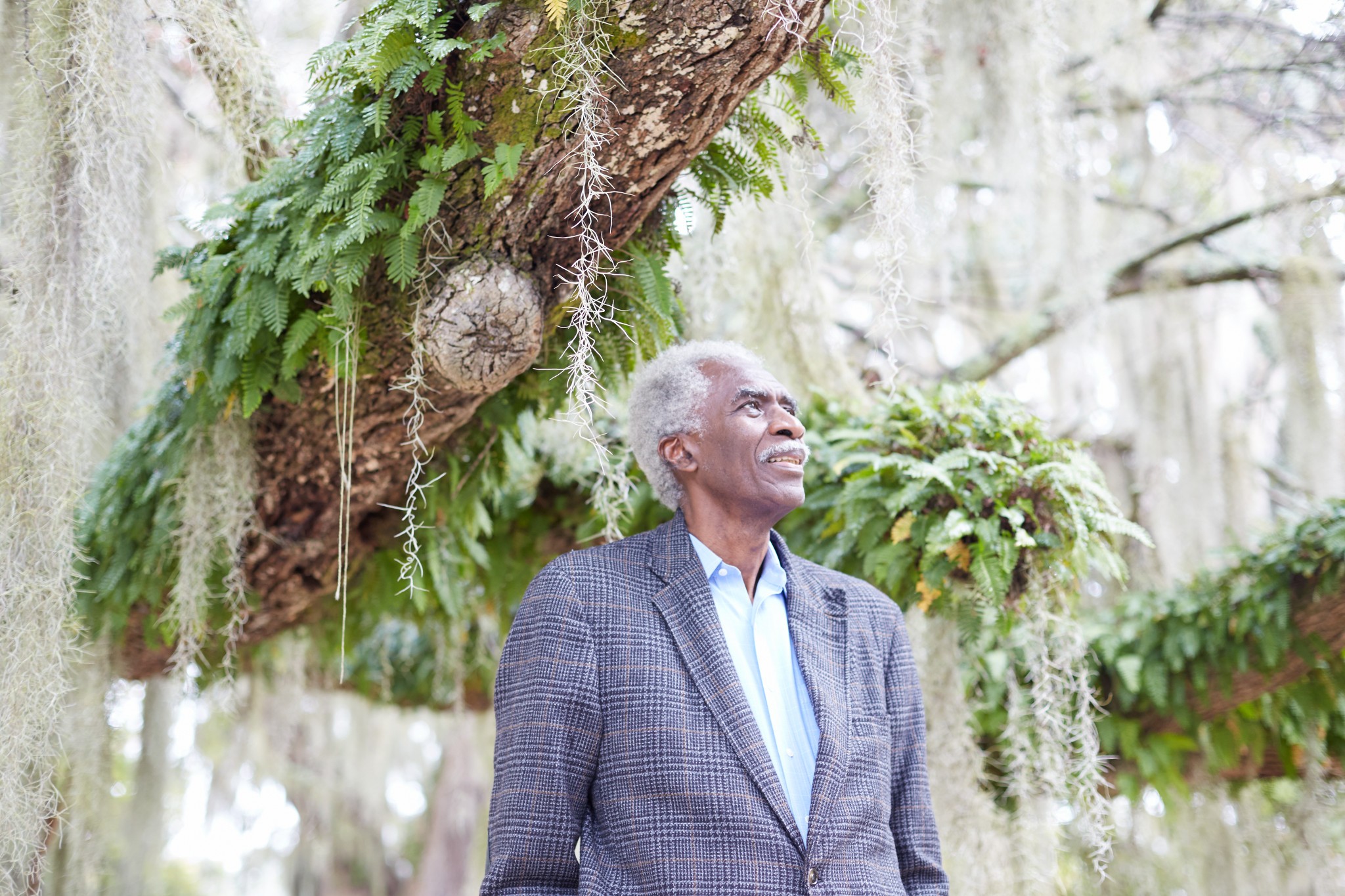 Gullah narrator and tour guide, Dr. Emory Campbell at Mitchelville Beach
Gullah narrator and tour guide, Dr. Emory Campbell at Mitchelville Beach
2. What Historical Sites Can You Explore on a Gullah Tourism Trip?
Gullah tourism offers a rich tapestry of historical sites that provide profound insights into the Gullah Geechee culture. These sites are vital in understanding the history, struggles, and resilience of this unique African American community.
What is the Significance of Gadsden’s Wharf?
Gadsden’s Wharf is the historic site where thousands of enslaved Africans first arrived in the United States. According to the International African American Museum, this location is significant because it symbolizes the beginning of the African American experience in America.
What is the Historical Importance of Mitchelville?
Mitchelville holds the distinction of being the first freedman village in the United States. Established during the Civil War, Mitchelville represents the first attempt at self-governance by formerly enslaved people, according to Explore Mitchelville. It stands as a symbol of hope and opportunity during a tumultuous period.
What Role Did the Penn Center Play in African American History?
The Penn Center, located on St. Helena Island, served as a school for freed slaves and later as a meeting place for civil rights leaders like Dr. Martin Luther King, Jr. According to the Penn Center, it played a crucial role in the education and empowerment of African Americans during the Civil Rights Movement.
How Does McLeod Plantation Offer Insight into Gullah Life?
McLeod Plantation provides a dual perspective on life during slavery, showcasing the experiences of both the planters and the enslaved people. According to the Charleston County Parks and Recreation, it offers insights into daily life, cotton cultivation, and the transition to freedom for the African Americans who lived there for nearly 200 years.
What Can You Learn at the Old Slave Mart Museum?
The Old Slave Mart Museum in Charleston is the last surviving slave auction gallery in South Carolina. According to the museum’s official website, it offers a haunting reminder of the human cost of the slave trade, with displays of artifacts such as slave yokes, whips, and shackles.
3. Where Can You Experience Authentic Gullah Cuisine During Your Trip?
Experiencing authentic Gullah cuisine is a crucial part of Gullah tourism, offering a taste of the rich culinary traditions passed down through generations. According to culinary historians, Gullah cuisine is rooted in West African culinary practices, blending traditional methods with ingredients available in the Lowcountry.
What Are Some Signature Dishes of Gullah Cuisine?
Signature dishes of Gullah cuisine include:
- Shrimp and Grits: A creamy, savory dish made with local shrimp and stone-ground grits.
- Okra Soup: A hearty soup made with okra, tomatoes, and various meats or seafood.
- Red Rice: Rice cooked with tomatoes, bacon, and spices, often served as a side dish.
- Sweet Potato Pie: A sweet, spiced pie made with sweet potatoes, a staple in Gullah cooking.
- Hoppin’ John: A flavorful dish made with black-eyed peas, rice, and bacon, traditionally eaten for good luck.
Where Can You Find Authentic Gullah Cuisine in the Lowcountry?
You can find authentic Gullah cuisine at the following establishments:
- Gullah Grub Restaurant: Located on St. Helena Island, Gullah Grub offers traditional Gullah dishes made with fresh, local ingredients.
- Buckshot’s Restaurant: Situated in McClellanville, Buckshot’s is known for its Gullah-inspired dishes and catering services.
- Local Farmers Markets: Many farmers markets in the Lowcountry feature Gullah vendors selling homemade dishes and local produce.
- Community Events: Keep an eye out for Gullah cultural festivals and events, where you can sample a variety of traditional foods.
How Does Gullah Cuisine Reflect Cultural Heritage?
Gullah cuisine reflects cultural heritage in several ways:
- West African Influences: Many dishes incorporate ingredients and cooking techniques brought from West Africa by enslaved Africans.
- Local Ingredients: Gullah cuisine utilizes locally sourced ingredients such as shrimp, oysters, rice, and okra.
- Family Recipes: Traditional recipes are often passed down through families, preserving culinary traditions.
- Community Celebrations: Food plays a central role in Gullah community celebrations, reinforcing cultural identity and social bonds.
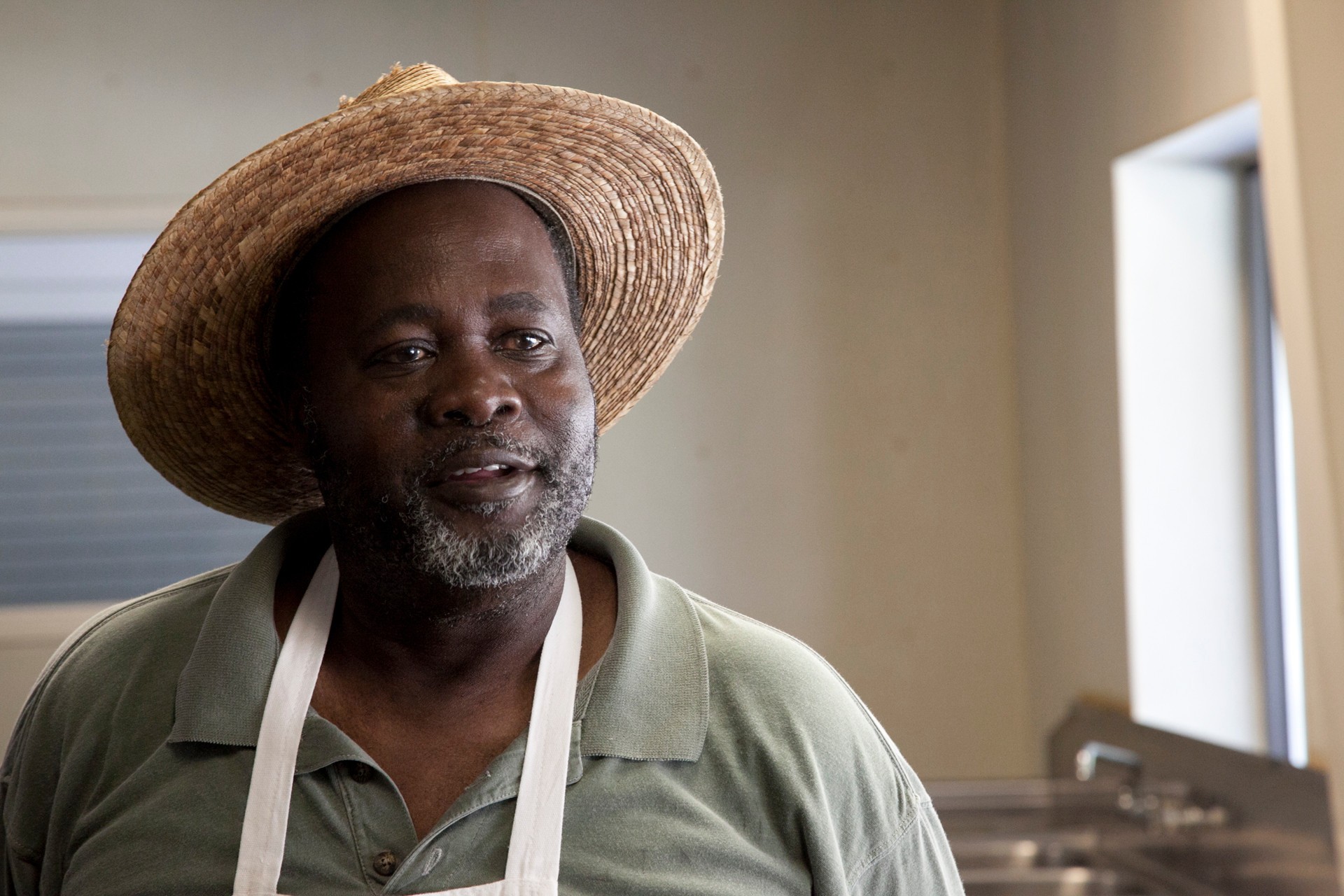 Chef Bill Green, owner of Gullah Grub Restaurant, cooks up authentic Gullah cuisine on St. Helena Island
Chef Bill Green, owner of Gullah Grub Restaurant, cooks up authentic Gullah cuisine on St. Helena Island
4. What Cultural Tours Are Available to Learn About Gullah History?
Cultural tours provide immersive experiences to learn about Gullah history, offering insights into the past and present of this unique community. According to historical societies, guided tours often include visits to significant sites, storytelling, and interactions with local community members.
What Can You Expect on a Gullah Heritage Trail Tour on Hilton Head Island?
On a Gullah Heritage Trail Tour on Hilton Head Island, you can expect to:
- Guided Bus Tour: A two-hour bus tour led by fourth- and fifth-generation Gullah guides.
- Historic Sites: Visits to historic sites such as Mitchelville, the first freedman village in the US.
- Family Compounds: Drives through Gullah family compounds to understand the community’s lifestyle.
- Historical Narration: Engaging narration of the history of West African slaves and their descendants.
What Makes Sallie Ann Robinson’s Gullah Tour on Daufuskie Island Unique?
Sallie Ann Robinson’s Gullah Tour on Daufuskie Island is unique because:
- Local Guide: The tour is led by Sallie Ann Robinson, a native islander and renowned Gullah chef.
- Personal Stories: Robinson shares personal stories and insights into growing up on Daufuskie Island.
- Historic Landmarks: The tour includes visits to a dozen historic landmarks, including Mary Fields Elementary School.
- Island Access: Daufuskie Island is accessible only by ferry, providing an isolated and authentic experience.
What Will You Discover on a Gullah Tour in Charleston?
On a Gullah Tour in Charleston, you will discover:
- Important Historical Sites: Visits to sites significant in the history of Charleston’s African Americans.
- Author-Led Tour: The tour is led by the author of “A Gullah Guide to Charleston.”
- Auction Site: Exploration of the place where enslaved Africans were auctioned to plantation owners.
- Cultural Insights: Insights into the original Catfish Row neighborhood and the Underground Railroad.
Are There Walking Tours Focused on Gullah Culture?
Yes, there are walking tours focused on Gullah culture, often available in historic districts like Charleston. These tours provide intimate explorations of neighborhoods, churches, and landmarks significant to the Gullah community.
How Can You Find and Book Gullah Cultural Tours?
You can find and book Gullah cultural tours through:
- SIXT.VN: Offering curated tours and experiences that highlight Gullah culture and history.
- Local Tourism Websites: Checking local tourism websites for tour operators specializing in Gullah heritage.
- Community Centers: Contacting Gullah community centers for information on local tours and guides.
- Online Travel Platforms: Using online travel platforms to search for and book Gullah cultural tours.
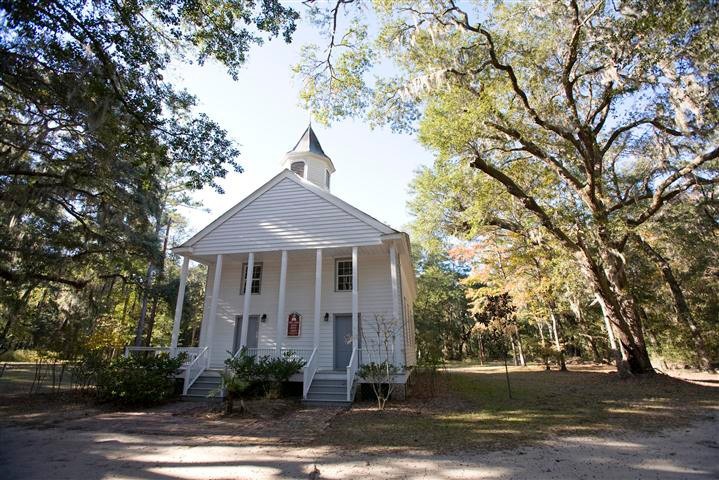 First Union African Baptist Church on Daufuskie Island is one of the historic buildings you'll see on a Sallie Ann Robinson bus tour
First Union African Baptist Church on Daufuskie Island is one of the historic buildings you'll see on a Sallie Ann Robinson bus tour
5. What Museums and Cultural Centers Showcase Gullah History and Art?
Museums and cultural centers play a crucial role in showcasing Gullah history and art. According to cultural preservation experts, these institutions provide spaces for education, exhibition, and community engagement.
What Exhibits Does the International African American Museum Offer?
The International African American Museum offers exhibits that:
- Showcase Resilience: Highlight the resilience, struggles, achievements, and triumphs of African Americans.
- Interactive Installations: Feature immersive displays and interactive installations.
- Thought-Provoking Artifacts: Provide a deeper understanding of the African American experience.
- Historical Site: Located on the historic site of Gadsden’s Wharf, where enslaved Africans arrived.
What Can You See at the York W. Bailey Museum at Penn Center?
At the York W. Bailey Museum at Penn Center, you can see:
- Photographs and Exhibits: Chronicling the history of the Penn Center and its impact on the community.
- Historical Artifacts: Displaying artifacts related to the school’s history and cultural significance.
- Educational Programs: Offering educational programs and workshops.
- Walking and Island Tours: Providing walking and island tours of the Penn Center.
What Does the Gullah Museum in Georgetown Offer Visitors?
The Gullah Museum in Georgetown offers:
- Presentations on Gullah History: Insight into the role African slaves played in the Lowcountry’s rice and indigo industry.
- Gullah Arts and Crafts: Showcasing Gullah story quilts and other traditional art forms.
- Artifacts on Display: Displaying artifacts related to Gullah history and culture.
- Storytelling: Providing storytelling sessions by shopkeeper and chief storyteller Andrew Rodrigues.
What Resources Does the Avery Research Center for African-American History and Culture Provide?
The Avery Research Center for African-American History and Culture provides:
- Archival Collections: Rich archival, art, and rare manuscript collections.
- Temporary Art Exhibitions: Featuring prominent and emerging artists.
- Historical Documentation: Documenting the history, traditions, legacies, and influence of African Americans.
- Self-Guided Tours: Offering self-guided tours on the second Wednesday of each month (advance registration required).
Are There Smaller, Community-Based Museums Focused on Gullah Culture?
Yes, there are smaller, community-based museums focused on Gullah culture. These museums often provide more intimate and personal perspectives on Gullah history and traditions.
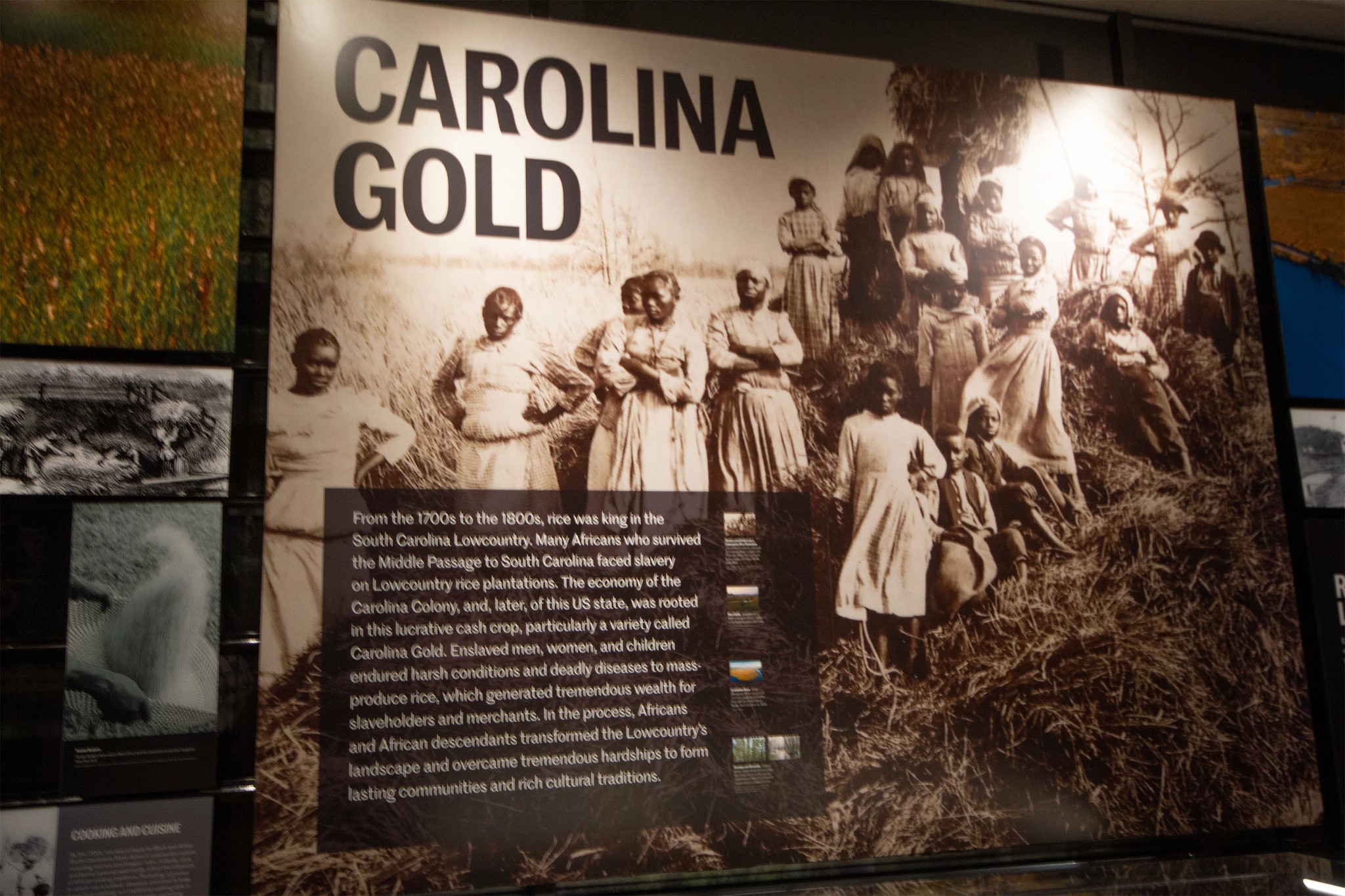 The International African American Museum showcases the resilience, struggles, achievements, and triumphs of African Americans, highlighting their pivotal roles in shaping American history and society
The International African American Museum showcases the resilience, struggles, achievements, and triumphs of African Americans, highlighting their pivotal roles in shaping American history and society
6. How Can You Participate in Gullah Cultural Events and Festivals?
Participating in Gullah cultural events and festivals offers a unique opportunity to immerse yourself in the traditions, music, and community spirit of the Gullah Geechee people. According to cultural event organizers, these events are vital for cultural preservation and community engagement.
What Types of Events Are Typically Held?
Gullah cultural events and festivals typically include:
- Music Performances: Featuring traditional Gullah spirituals, gospel music, and contemporary Gullah music.
- Dance Performances: Showcasing traditional Gullah dances like the ring shout.
- Food Festivals: Offering a taste of authentic Gullah cuisine, from shrimp and grits to sweet potato pie.
- Arts and Crafts Fairs: Displaying and selling traditional Gullah art forms like sweetgrass baskets and quilts.
- Storytelling Sessions: Featuring Gullah storytellers sharing traditional tales and historical narratives.
- Historical Presentations: Providing educational presentations on Gullah history and culture.
When and Where Are These Events Held?
These events are held throughout the year in various locations across the Lowcountry. Some notable events and locations include:
- Gullah Festival of South Carolina: Held annually in Beaufort, SC, celebrating Gullah heritage through music, food, and art.
- Sweetgrass Festival: Taking place in Mount Pleasant, SC, showcasing the art of sweetgrass basket weaving.
- Penn Center Heritage Days: Celebrated on St. Helena Island, offering cultural performances, workshops, and historical presentations.
- Local Community Celebrations: Various community centers and churches host smaller events throughout the year.
How Can You Find Information on Upcoming Events?
You can find information on upcoming events through:
- SIXT.VN: Offering event listings and travel packages that include cultural events.
- Local Tourism Websites: Checking local tourism websites for event calendars.
- Community Centers: Contacting Gullah community centers for event information.
- Social Media: Following Gullah cultural organizations and events on social media.
What Should You Expect When Attending a Gullah Cultural Event?
When attending a Gullah cultural event, you should expect:
- Authentic Cultural Experiences: Immersive experiences in Gullah traditions, music, and art.
- Community Engagement: Opportunities to interact with Gullah community members and learn about their culture.
- Respectful Behavior: Showing respect for Gullah traditions and customs.
- Learning Opportunities: Educational opportunities to learn about Gullah history and heritage.
Are There Specific Etiquette Tips for Attending These Events?
Yes, specific etiquette tips for attending these events include:
- Dress Respectfully: Dress modestly and respectfully.
- Engage Politely: Engage with community members politely and respectfully.
- Ask Questions: Ask questions to learn more about Gullah culture.
- Support Local Vendors: Support local vendors by purchasing their products.
- Be Mindful of Photography: Be mindful when taking photographs and ask for permission when photographing individuals.
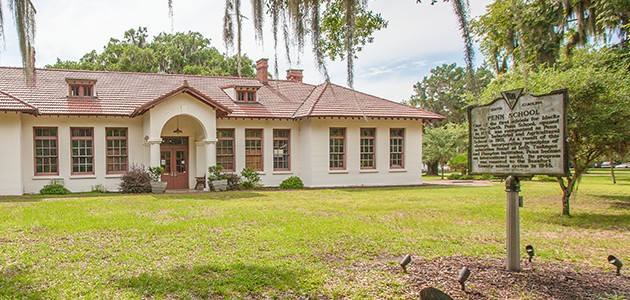 The Penn Center on St. Helena Island is a National Historic Landmark
The Penn Center on St. Helena Island is a National Historic Landmark
7. What Role Does Sweetgrass Basket Weaving Play in Gullah Culture?
Sweetgrass basket weaving is a significant art form in Gullah culture, representing a blend of tradition, skill, and cultural identity. According to art historians, sweetgrass basket weaving dates back to West African techniques and has been passed down through generations in Gullah communities.
What is Sweetgrass and Where Does it Come From?
Sweetgrass is a fragrant grass native to the coastal regions of South Carolina and Georgia. According to local artisans, it is harvested and dried before being used in basket weaving.
What Other Materials Are Used in Basket Weaving?
Other materials used in basket weaving include:
- Pine Needles: Providing structure and texture to the baskets.
- Palmetto Leaves: Adding strength and durability.
- Bulrush: Offering additional texture and color.
How Are Sweetgrass Baskets Made?
Sweetgrass baskets are made through a meticulous process:
- Gathering Materials: Harvesting and preparing sweetgrass, pine needles, palmetto leaves, and bulrush.
- Coiling: Coiling the sweetgrass and other materials into the desired shape.
- Binding: Binding the coils together with strips of palmetto leaves or other materials.
- Finishing: Trimming and shaping the basket to create a finished product.
Where Can You Purchase Authentic Sweetgrass Baskets?
You can purchase authentic sweetgrass baskets at:
- Roadside Stands: Along Highway 17 in Mount Pleasant, SC, where Gullah artisans sell their baskets.
- Arts and Crafts Fairs: At Gullah cultural festivals and arts and crafts fairs.
- Online Marketplaces: Through online marketplaces that feature Gullah art and crafts.
- Community Centers: At Gullah community centers that support local artisans.
What is the Cultural Significance of Sweetgrass Baskets?
The cultural significance of sweetgrass baskets includes:
- Tradition: Representing a long-standing tradition passed down through generations.
- Cultural Identity: Serving as a symbol of Gullah cultural identity and heritage.
- Economic Empowerment: Providing income for Gullah artisans and their families.
- Artistic Expression: Reflecting the artistic skill and creativity of Gullah basket weavers.
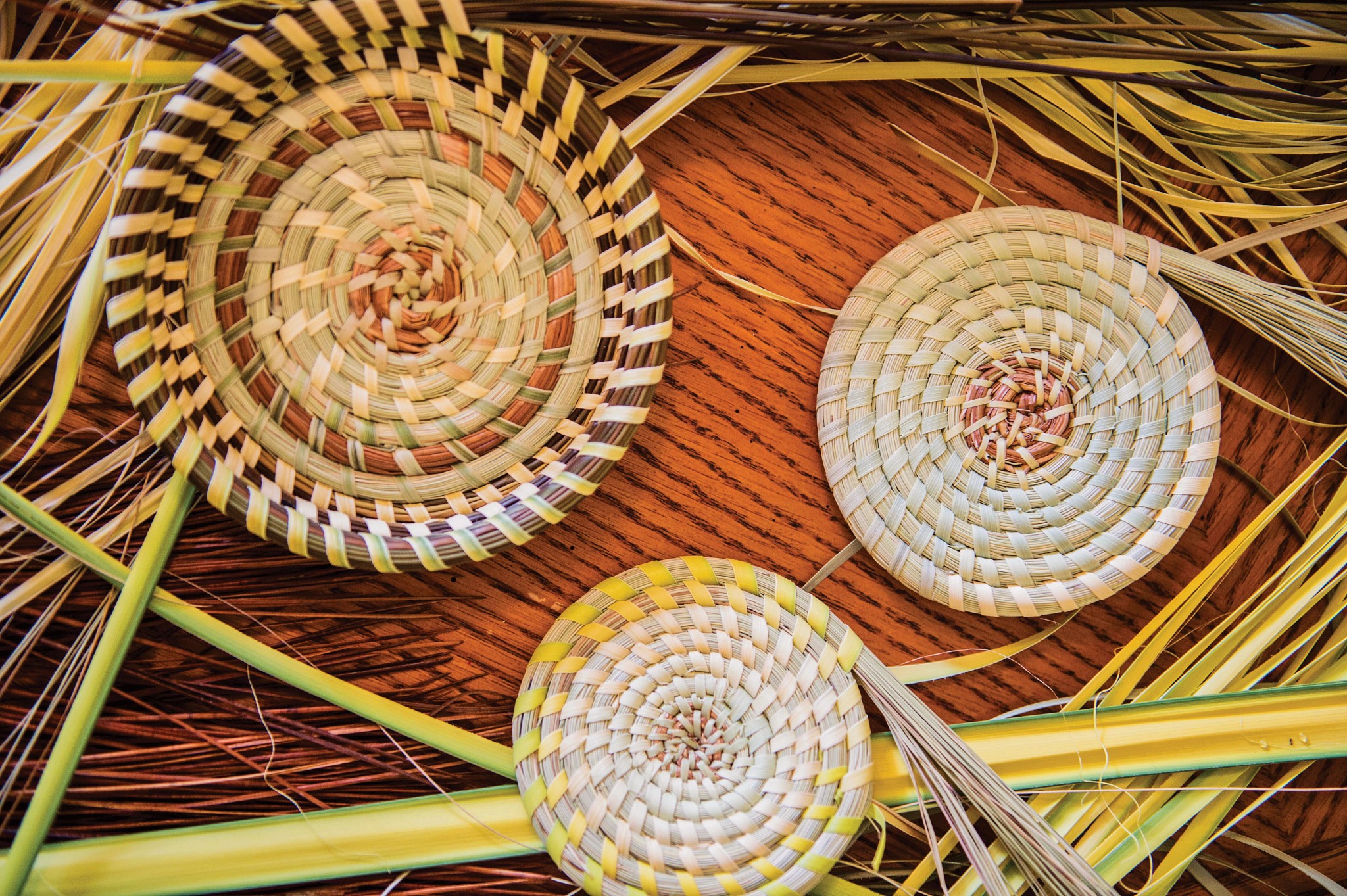 The Gullah Geechee are known for their sweetgrass baskets
The Gullah Geechee are known for their sweetgrass baskets
8. How Can You Support Gullah Communities Through Tourism?
Supporting Gullah communities through tourism involves engaging in responsible and respectful travel practices that benefit the local economy and cultural preservation efforts. According to community development organizations, sustainable tourism can empower local communities and promote cultural heritage.
What Are Some Ways to Support Gullah Communities Through Tourism?
Ways to support Gullah communities through tourism include:
- Shop Locally: Purchase goods and services from Gullah-owned businesses and artisans.
- Take Guided Tours: Participate in tours led by Gullah guides who can share their personal stories and cultural insights.
- Stay in Local Accommodations: Choose accommodations that are owned and operated by Gullah community members.
- Eat at Gullah Restaurants: Dine at restaurants that serve authentic Gullah cuisine.
- Attend Cultural Events: Attend Gullah cultural events and festivals to support local artists and performers.
- Donate to Community Organizations: Donate to organizations that support Gullah cultural preservation and community development.
Why is it Important to Choose Authentic Gullah Experiences?
Choosing authentic Gullah experiences is important because:
- Supports Local Economy: It ensures that your money directly benefits Gullah communities.
- Preserves Cultural Heritage: It helps preserve Gullah traditions and customs by supporting cultural practitioners.
- Provides Accurate Representation: It offers accurate and respectful portrayals of Gullah history and culture.
- Promotes Cultural Exchange: It fosters meaningful cultural exchange between visitors and Gullah community members.
How Can You Ensure That Your Tourism Activities Are Respectful?
You can ensure that your tourism activities are respectful by:
- Learning About Gullah Culture: Educate yourself about Gullah history, traditions, and customs before your visit.
- Asking Permission: Ask permission before taking photographs of people or entering private property.
- Being Mindful of Language: Use respectful and appropriate language when interacting with community members.
- Following Local Guidelines: Follow local guidelines and regulations when visiting historical sites and cultural landmarks.
- Supporting Sustainable Practices: Support tourism businesses that prioritize sustainability and cultural preservation.
Are There Specific Organizations That Support Gullah Communities?
Yes, there are specific organizations that support Gullah communities, including:
- The Penn Center: Promoting education, cultural preservation, and community development on St. Helena Island.
- Gullah Geechee Cultural Heritage Corridor Commission: Working to preserve and promote Gullah Geechee culture along the Atlantic coast.
- Local Community Centers: Various community centers that support Gullah cultural initiatives and community development.
How Can Volunteering Contribute to Gullah Community Support?
Volunteering can contribute to Gullah community support by:
- Participating in Cultural Preservation Projects: Assisting with efforts to preserve Gullah language, traditions, and historical sites.
- Supporting Educational Programs: Helping with educational programs that teach Gullah history and culture to youth and adults.
- Assisting with Community Events: Volunteering at Gullah cultural events and festivals.
- Providing Technical Assistance: Offering technical assistance to Gullah-owned businesses and community organizations.
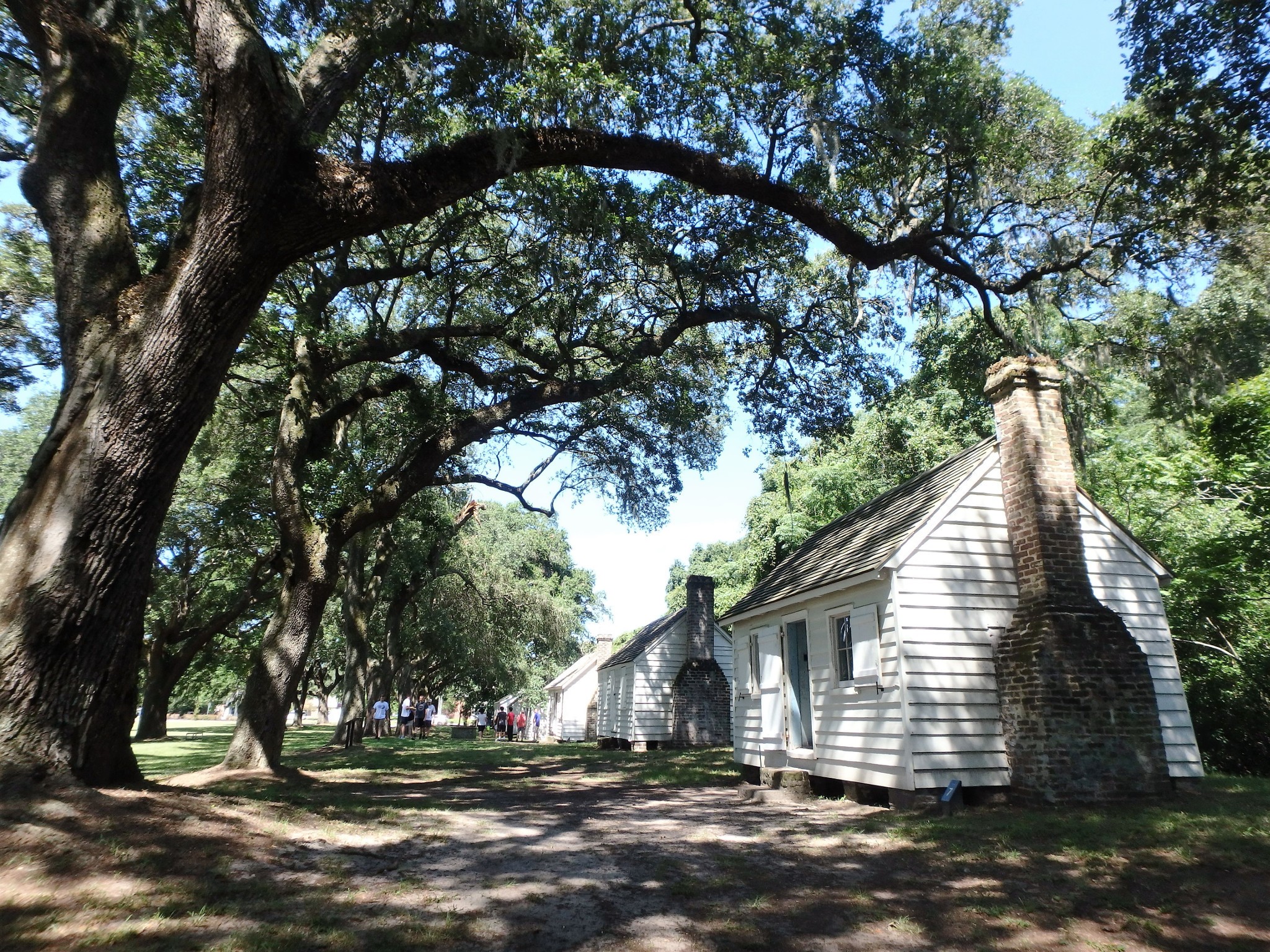 McLeod Plantation Offers a Glimpse at the Disparate Lives of a Wealthy Planter's Family and Slaves
McLeod Plantation Offers a Glimpse at the Disparate Lives of a Wealthy Planter's Family and Slaves
9. What Are the Best Times to Visit for Gullah Cultural Events?
The best times to visit for Gullah cultural events depend on specific festivals and celebrations, but generally, the spring and fall offer pleasant weather and a variety of activities. According to event calendars, many festivals are scheduled during these seasons to attract both locals and tourists.
What Spring Events Celebrate Gullah Culture?
Spring events that celebrate Gullah culture include:
- Gullah Festival of South Carolina (Beaufort, SC): Held annually in late May, this festival features music, food, art, and cultural demonstrations.
- Sweetgrass Festival (Mount Pleasant, SC): Celebrated in June, this festival showcases the art of sweetgrass basket weaving and Gullah crafts.
- বিভিন্ন স্থানীয় কমিউনিটি সেলিব্রেশন: Spring also marks the beginning of various local community celebrations.
What Fall Festivals Showcase Gullah Heritage?
Fall festivals that showcase Gullah heritage include:
- Penn Center Heritage Days (St. Helena Island, SC): Held in November, this event offers cultural performances, workshops, and historical presentations.
- বিভিন্ন স্থানীয় কমিউনিটি ফেষ্টিভেল: Numerous smaller, local community festivals also occur during the fall.
Are There Summer Events Focused on Gullah Culture?
Yes, there are summer events focused on Gullah culture, though they may be fewer in number due to the hotter weather. These events often include:
- কমিউনিটি ফুড ফেষ্টিভেল: Summer also includes community food festivals.
- আর্টস এণ্ড ক্রাফটস ফেয়ার: Arts and crafts fairs.
- আউটডোর মিউজিক কনসার্ট: Outdoor music concerts.
Do Winter Months Offer Any Gullah Cultural Experiences?
Winter months may have fewer outdoor festivals, but they often feature:
- মিউজিয়াম এক্সিবিশন: Museum exhibitions.
- ইনডোর পারফরমেন্স: Indoor performances.
- শিক্ষামূলক প্রোগ্রাম: Educational programs.
- স্পেশাল হলিডে ইভেন্ট: Special holiday events that highlight Gullah traditions.
How Can You Find a Detailed Calendar of Events?
You can find a detailed calendar of events through:
- SIXT.VN: Offering curated event listings and travel packages.
- Local Tourism Websites: Checking local tourism websites for event calendars.
- Community Centers: Contacting Gullah community centers for event information.
- Social Media: Following Gullah cultural organizations and events on social media.
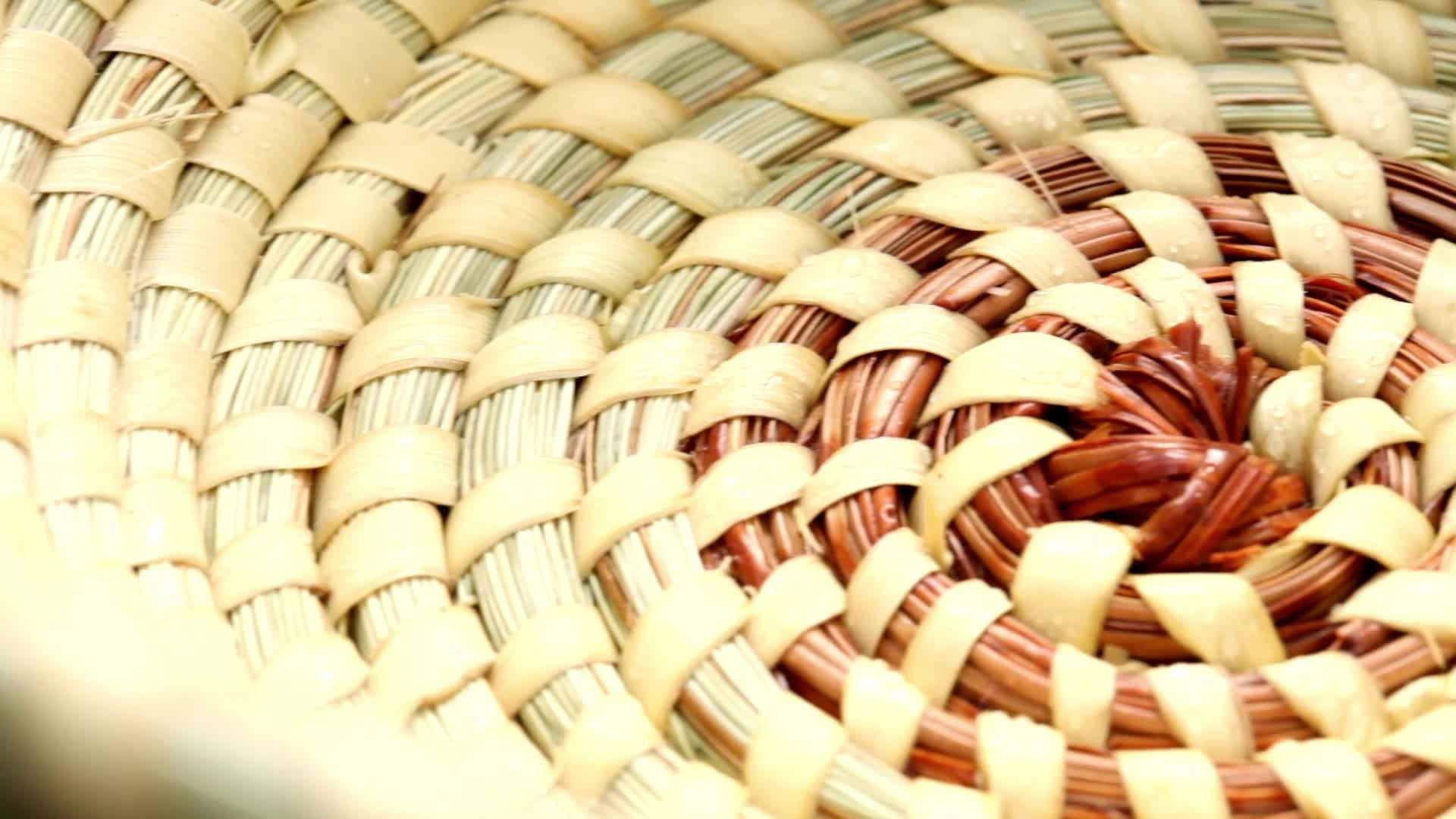 The Gullah Museum in Georgetown offers presentations on the Gullah Geechee history, arts, crafts and culture
The Gullah Museum in Georgetown offers presentations on the Gullah Geechee history, arts, crafts and culture
10. What Travel Tips Should You Keep in Mind When Planning a Gullah Tourism Trip?
Planning a Gullah tourism trip requires consideration of local customs, historical context, and logistical details. By keeping these travel tips in mind, you can ensure a respectful and enriching experience.
How Can SIXT.VN Help You Plan Your Trip?
SIXT.VN can assist you in planning your trip by:
- Providing Travel Packages: Offering curated travel packages that include accommodations, tours, and cultural experiences.
- Arranging Transportation: Assisting with transportation needs, such as airport transfers and car rentals.
- Booking Accommodations: Recommending and booking accommodations that are locally owned and operated.
- Curating Tours and Activities: Recommending and booking authentic Gullah cultural tours and activities.
What Should You Know About Local Customs and Etiquette?
When visiting Gullah communities, it’s important to:
- Dress Modestly: Dress modestly and respectfully.
- Be Polite: Be polite and respectful when interacting with community members.
- Ask Permission: Always ask permission before taking photographs of people or entering private property.
- Support Local Businesses: Support local businesses by purchasing goods and services from Gullah-owned establishments.
What Documents Do You Need for Travel?
Depending on your origin and destination, you may need:
- Identification: A valid government-issued photo ID.
- Passport: A passport, especially if traveling internationally.
- Visas: Visas, if required by your destination country.
- Travel Insurance: Travel insurance to cover unexpected medical expenses or trip cancellations.
What Health and Safety Precautions Should You Take?
Prioritize your health and safety by:
- Consulting Healthcare Professionals: Consulting with healthcare professionals regarding necessary vaccinations and health precautions.
- Checking Travel Advisories: Checking travel advisories for your destination.
- Following Safety Guidelines: Following local safety guidelines and regulations.
- Purchasing Travel Insurance: Purchasing travel insurance that covers medical emergencies and other unforeseen events.
How Can You Stay Connected During Your Trip?
You can stay connected during your trip by:
- Purchasing a Local SIM Card: Purchasing a local SIM card for your phone to access data and make calls.
- Using Wi-Fi: Utilizing Wi-Fi hotspots at hotels, cafes, and public areas.
- Staying Informed: Stay informed about travel updates.
Planning a trip to experience Gullah tourism is more than just a vacation; it’s an opportunity to immerse yourself in a rich and unique culture. From the historical sites to the authentic cuisine, the sweetgrass basket weaving to the vibrant cultural events, every aspect of Gullah tourism offers a deep dive into the heritage of the Gullah Geechee people.
Ready to explore the Lowcountry and discover the magic of Gullah tourism? Let SIXT.VN be your guide. We offer curated travel packages, authentic tour experiences, and comfortable accommodations to ensure your trip is seamless and memorable. Contact us today to start planning your Gullah adventure!
Address: 260 Cau Giay, Hanoi, Vietnam
Hotline/Whatsapp: +84 986 244 358
Website: SIXT.VN
FAQ About Gullah Tourism
What is Gullah Tourism?
Gullah tourism focuses on the heritage, traditions, and historical experiences of the Gullah Geechee people, an African American community in the coastal regions of South Carolina and Georgia.
Why is Gullah Tourism Important?
It supports cultural preservation, empowers local communities, provides educational value, and fosters community engagement.
What Cultural Elements Define Gullah Tourism?
Gullah language, cuisine, arts and crafts, music and dance, and historical sites.
What Are Some Must-Visit Historical Sites?
Gadsden’s Wharf, Mitchelville, Penn Center, McLeod Plantation, and Old Slave Mart Museum.
Where Can You Experience Authentic Gullah Cuisine?
Gullah Grub Restaurant, Buckshot’s Restaurant, local farmers markets, and community events.
What Types of Cultural Tours Are Available?
Gullah Heritage Trail Tour on Hilton Head Island, Sallie Ann Robinson’s Gullah Tour on Daufuskie Island, and Gullah Tour in Charleston.
What Museums and Cultural Centers Showcase Gullah History and Art?
International African American Museum, York W. Bailey Museum at Penn Center, Gullah Museum in Georgetown, and Avery Research Center for African-American History and Culture.
What is Sweetgrass Basket Weaving?
A traditional art form in Gullah culture using sweetgrass, pine needles, palmetto leaves, and bulrush.
How Can You Support Gullah Communities Through Tourism?
Shop locally, take guided tours, stay in local accommodations, eat at Gullah restaurants, and donate to community organizations.
When Are the Best Times to Visit for Gullah Cultural Events?
Spring and fall offer pleasant weather and a variety of festivals and events.



